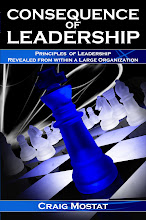I was sitting beside a college while he was reading his email. He nudges me with his elbow to get me to look at a message from one of his managers and with pride says, "Look at that quick response!" He was proud of the quick reaction of his manager and wanted to brag a little about it. It is a natural tendency to feel good when our people perform well and to want others to know about it.
He seemed to be moving on to other messages, so I asked him how he was going to re-enforce that behaviour.
"What do you mean?" he asked.
"You are clearly happy with what he has done, so don't you want to recognize it so that it is repeated?" I clarified.
He immediately started to type an enthusiastic reply to the original message while reading aloud his positive, complimentary words as he typed.
I realize that this is really quite basic, but at the same time, it is often overlooked. The premise of the book "Whale Done!," (Authors: Ken Blanchard, Thad Lacinak, Chuck Tompkins, Jim Ballard) is that we will achieve desired performance more rapidly if we only reward good performance and completely ignore bad or negative behaviour.
I'll bring it home for illustration. If my daughter helps around the house, I provide positive recognition. If she does not, I say nothing and do not show any disapproval. I focus my attention on her subjects with good marks, and completely ignore those that are not satisfactory.
I have to admit that this is hard, primarily because of the way we are taught. The world generally does not work like this. You aren't pulled over by a police officer and rewarded because they were driving the speed limit.
If . . . when, we spend the majority of our time catching people doing things right, I believe that we will achieve performance and results beyond what we even thought was possible.
Which behaviours have you been re-enforcing?



